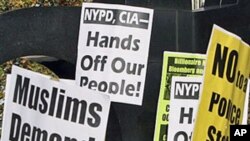Hundreds of Muslims staged a rally and public prayers in New York City Friday, to protest alleged ethnic and religious profiling in their community by the city's police department.
Demonstrators gathered in New York’s Foley Square chanting for an end to surveillance. They also held signs condemning the New York City Police Department for allegedly infiltrating mosques, spying on Muslim student groups, cataloguing Middle Eastern restaurants and compiling data on Arab cab drivers. The charges came to light in a recent investigative report by the Associated Press.
In a sermon at the rally during traditional Friday Muslim prayers, Imam Talib Abdur-Rashid said Muslims in the United States are unapologetic about their faith and uncompromisingly American.
“Our American identity is based on ideals, and principals and affirmation of truth. We affirm the American dream,” he said.
One of the signs at the rally said “The police watch us. Who’s watching the police?”
The National Lawyers Guild does just that. A team from the non-profit federation of lawyers, legal workers, and law students came to the rally to observe interaction between the protesters and police. Guild member Bina Ahmad said government surveillance without probable cause violates the Fourth Amendment to the U.S. Constitution. She said there is no valid reason for infiltrating the Muslim community.
“We all have the right to be free and equal citizens, have the right to free speech, to be free of a police state," said Ahmad. "We have the Fourth Amendment, your right against unreasonable search and seizure. And we’re all law-abiding citizens.”
An NYPD liaison with the Muslim community declined VOA’s request for comment, pointing instead to Police Commissioner Ray Kelly’s recent testimony at a City Council hearing about the surveillance. Kelly said the NYPD does not engage in racial profiling, but rather, “follows leads wherever those leads may take us.” One council member asked if police have ever gone to a mosque or followed a person without a specific lead. Kelly said he could not answer that definitively.
Muslim Protesters Demand End to Surveillance




